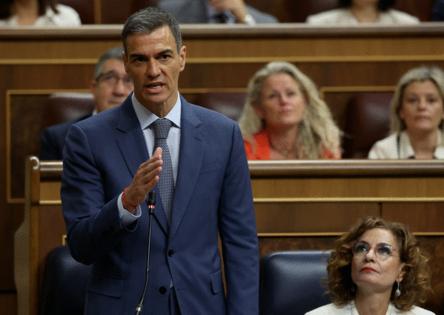Spain's leader calls US levies 'doubly unfair' in trade spat
Published in News & Features
Prime Minister Pedro Sanchez defended his decision to break with his NATO allies over increases in military spending and called President Donald Trump’s tariffs on Spain “doubly unfair.”
“Europe and the world have been suffering from a trade war, from tariff measures that we have considered — at least in Spain — from the first minute as unfair and also unilateral,” Sanchez told reporters in Brussels Thursday. “In the case of Spain, they’re doubly unfair.”
Sanchez pointed out that Spain has a trade deficit with the U.S. — whereas it’s the trade surpluses that many other countries have with the U.S. that have driven Trump’s tariff policy.
Members of the North Atlantic Treaty Organization agreed at a summit Wednesday to raise their spending on defense to 5% of GDP. Sanchez, however, has refused to meet the new target, saying Spain will only raise its defense expenditure to 2.1%, “nothing more, nothing less.”
Sanchez has said Spain will meet the alliance’s ambitious new weapons and troop targets, but without committing to the price tag that NATO had attached to it. Sanchez has drawn sharp criticism from fellow NATO members.
Trump criticized Sanchez after the summit in the Hague after the rest of the alliance’s members agreed to the new spending target.
“You’re the only country that is not paying. I don’t know what the problem is,” Trump said. “We’ll make it up. You know, we’re going to do, we’re negotiating with Spain on a trade deal. We’re going to make them pay twice as much. And I’m actually serious about that.”
Spain is part of the European Union, which is racing to clinch a trade deal with Washington before tariffs on nearly all its exports to the U.S. jump to 50% on July 9. The European Commission, the executive arm of the E.U., handles trade matters for the 27-member bloc — individual member states don’t negotiate trade deals on their own.
The Spanish economy is growing more than its biggest euro-area partners. Its GDP is expected to expand by 2.4% this year compared to 0.9% for the euro area, according to the Bank of Spain and ECB forecasts. Fueled by tourism, employment has hit record highs not seen since before the financial crisis.
Politically, Sanchez is in one of the most difficult moments of his tenure as prime minister. He runs a minority government that has been unable to pass a budget since the end of 2022 and struggles to garner parliamentary support for key laws in parliament. Two weeks ago, a corruption scandal involving his Socialist party broke out adding to ongoing court cases with his former advisers and members of his own family.
Sanchez has acknowledged his weakness in parliament, saying that if he was to call an election he wouldn’t get enough support to stay in government and has said he plans to finish his term, due to end in 2027, and run again for reelection.
©2025 Bloomberg L.P. Visit bloomberg.com. Distributed by Tribune Content Agency, LLC.







Comments